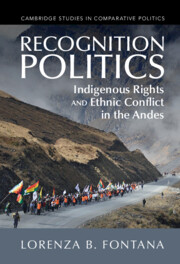Crossref Citations
This Book has been
cited by the following publications. This list is generated based on data provided by Crossref.
Munck, Ronaldo
2024.
Coloniality of Power and Progressive Politics in Latin America.
p.
105.
Fontana, Lorenza B.
Dyngeland, Cecilie
and
Dexter, Kyle G.
2024.
Demographic pressure as a factor in inter-ethnic conflicts: evidence from Colombia.
Ethnic and Racial Studies,
p.
1.
Lupien, Pascal
Rincón, Adriana
Lalama Vargas, Andrés
Machaca, Soledad
and
Chiriboga, Gabriel
2024.
#Resistencia: Indigenous Movements, Social Media, and Mobilization in Latin America.
Latin American Research Review,
Vol. 59,
Issue. 4,
p.
803.
Cabrera Silva, Angel Gabriel
and
Fontana, Lorenza B.
2024.
Indigenous vs. Peasants’ rights?
Lhaka Honhat v. Argentina
and the role of the Inter-American Human Rights System in communal interethnic conflicts
.
Journal of Human Rights,
Vol. 23,
Issue. 5,
p.
492.
Rodríguez-Cáceres, Andrés
and
Behrman, Julia
2024.
Demarcation and Difference: Language and Indigenous Self-Identity in Latin America.
Socius: Sociological Research for a Dynamic World,
Vol. 10,
Issue. ,
Fontana, Lorenza B.
2024.
Seeing others. Seeing us.
Ethnic and Racial Studies,
Vol. 47,
Issue. 13,
p.
2770.
Sarma Bhagabati, Dikshit
2025.
Human rights as a claim for recognition: Towards an ecumenical anthropology of dignity and personhood.
Thesis Eleven,



